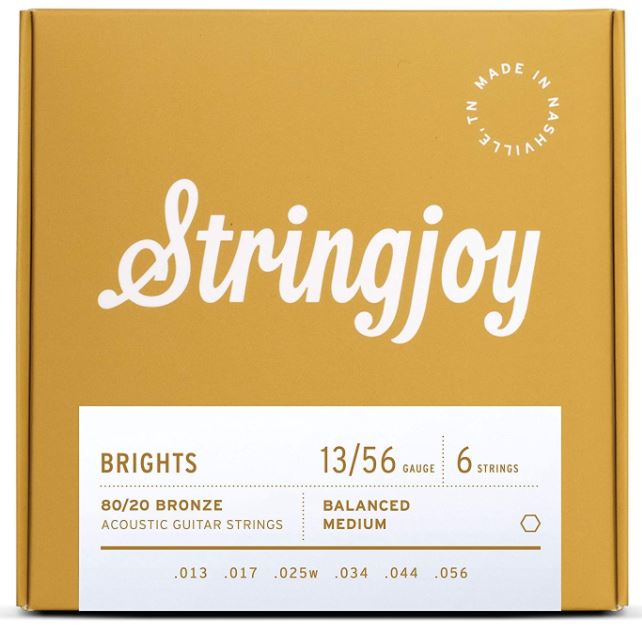Any seasoned acoustic guitar player will tell you that putting a great set of strings on your guitar is like a cheat code for great tone, and if you’re trying to unlock the best possible sound from your acoustic, stringing up with a set of Ernie Ball Aluminum Bronze Strings is a great start. These US made strings are available in practically every music store, making them easy to find, and they’re some of the most consistently made strings on the market, too. They offer a great balance of warmth and shimmer, and suit pretty much every style of acoustic guitar and genre of music, too. Not only do these strings offer great longevity thanks to their aluminum content, but they also offer fantastic feel, too, and this is why we’ve named them as our Top Pick.
If you prefer strings with a more traditional tone, we’d suggest taking a look at the Stringjoy Bright Bronze Acoustic Guitar Strings. They’re a more expensive string, but the price is justified by the beautiful tones from the high quality 80/20 bronze, as well as the superb articulation and projection that these hand made strings offer. In these strings, Stringjoy has managed to craft a premium 80/20 bronze that not only delivers tonally, but also in terms of longevity. Even though Stringjoy has become a huge name in the strings world, they still offer the same “mom and pop” customer service, they’re so well known for, too, which is something many players really value, especially when buying high end strings. This is why we’ve named the Stringjoy Bright Bronze Acoustic Guitar Strings as our Editor’s Choice.
If you’re looking to spend as little as possible and still get a great set of strings, we think you’ll really be interested in the D’Addario Phosphor Bronze Acoustic Guitar Strings. These strings offer excellent versatility across the genres, and serve up clear, well defined mids. The phosphor in the alloy really helps with longevity, and fingerstyle players will definitely love the balance and the projection that they offer. These strings are incredibly affordable, making it easy to keep a large supply on hand, and its this value for money that led us to name these D’Addario Phosphor Bronze strings as our Best Budget choice.
Read more about our review process.
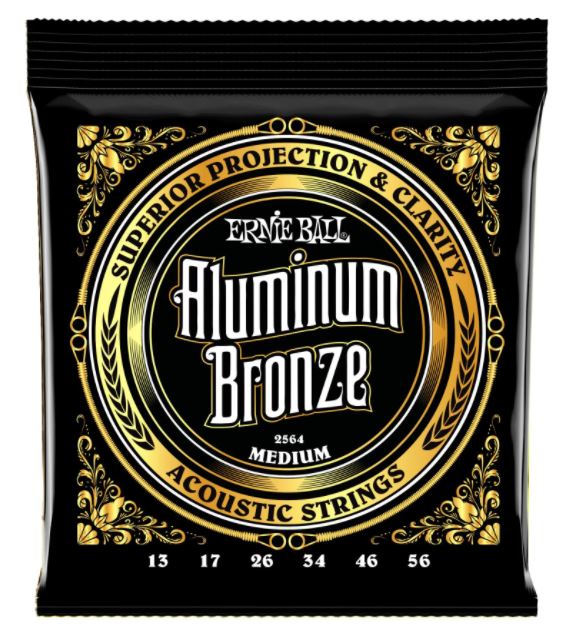
- Great Value Strings
- Aluminum Bronze
- Powerful Bass
- Bell Clarity
- Ernie Ball consistency
- Available as 10s, 11s, 12s, 13s
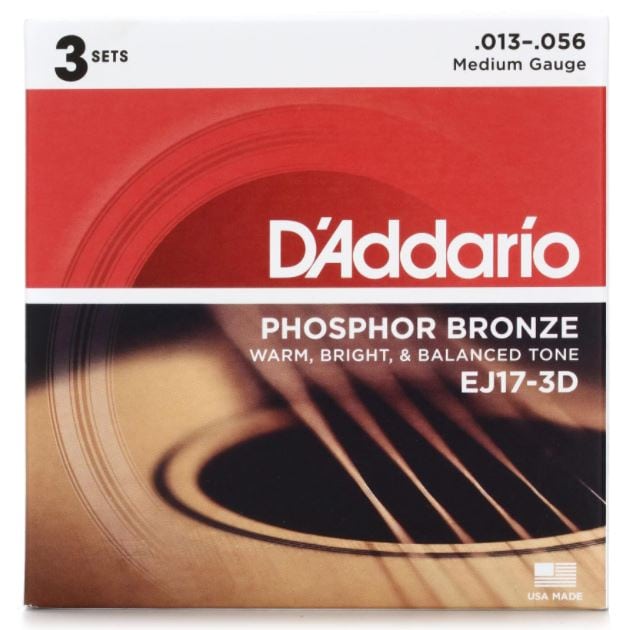
- Excellent Budget String
- Phosphor Bronze
- Clear Mids
- Average tuning stability
- Available as 10s, 11s, 12s, 13s
Contents
- What Are The Different Types of Acoustic Guitar Strings?
- Are Guitar Strings Expensive?
- Individual Reviews
- Ernie Ball Aluminum Bronze Acoustic Strings
- D'Addario EJ17 Phosphor Bronze Acoustic Strings
- Stringjoy Brights 80/20 Bronze Acoustic Strings
- Martin SP Silk and Steel Acoustic Strings
- D'Addario XS Phosphor Bronze Acoustic Strings
- Ernie Ball Earthwood 80/20 Bronze Acoustic Strings
- Dean Markley Blue Steel Acoustic Strings
- Final Thoughts
What Are The Different Types of Acoustic Guitar Strings?
There’s no one best type of guitar string. Finding the best strings for you will involve taking a look at your playing style, the tone you want, and your experience level from beginner to advanced.
80/20 Bronze
Bronze strings are amongst the most common for acoustic guitar. Because they’re bronze, they are made as an alloy of copper (80%) and tin (20%). Bronze strings offer a cheery, bright tone and huge sustain.
While fresh bronze strings look, and sound great, they do begin oxidizing almost as soon as they’re removed from the packet, and this is accelerated when you play them. They are a cost effective option, but will require frequent changes.
Phosphor Bronze
Phosphor bronze strings have a bronze base, but phosphor is included during the alloying process. The net effect of the introduction of phosphor into the alloy is a mellower, and overall warmer sound than straight bronze.
Phosphor also adds additional corrosion resistance, which helps to prolong the lifespan of phosphor bronze strings over bronze.
Aluminum Bronze
Aluminum bronze strings are one of the newer types of acoustic string, and of course, as you can probably guess, they add aluminum into the alloy during manufacturing. Aluminum bronze strings offer excellent bass response, as well as shimmering highs. Because of aluminum’s exceptional corrosion resistance, they also offer great longevity.
Polymer-Coated
Polymer coated strings start off as regular guitar strings, but add a protective polymer coating to the exterior. Different manufacturers have their own proprietary coating blends, but they all work in similar ways.
Once a string is coated, it becomes smoother, which reduces string squeak, and noticeably improves playability. Additionally, the coating prevents oxygen reacting with the metal content of the string, which prevents them from premature dulling, helping them to last longer than any non-coated string.
Polymer coating isn’t a cure all though, these benefits do cost you a fairly significant amount of brightness, and sustain. The thicker the coating, the more profound the loss of tone.
Silk and Steel
Instead of winding the core in a metallic wrap, silk and steel strings use nylon filaments to cover the steel core. They are primarily used by folk and fingerstyle players looking for soft, mellow tones.
The nylon wrap can prevent proper recognition by electromagnetic pickups, so they aren’t ideal for some electric-acoustic guitars, although if the guitar is equipped with a piezo pickup, there won’t be any issues.
Nylon Strings
Nylon guitar strings are a type of strings used on classical and flamenco guitars, as well as some acoustic guitars designed for a mellower, softer sound. These strings are made from various types of nylon and other synthetic materials. Beginners, particularly younger beginners, often start out with nylon strings because they tend to be easier on the fingers.
Are Guitar Strings Expensive?
Strings are definitely one of the guitar consumables that you will absolutely notice differences between budget and premium examples. Although, not all cheap strings are bad, and not all expensive strings are good!
One thing that low end strings will almost certainly not offer is reliability. They will likely be made of lower quality metals, meaning they’ll dull quickly, they’ll corrode, and even rust, they’ll offer minimal sustain, and they’ll break much more readily than a premium string would.
The price of strings depends on a few factors. The technology that they use, whether they’re coated or not, or the number of strings in the pack. For example, strings for 12 string guitars cost more than they do for a standard 6 string because they have double the number of strings.
Individual Reviews
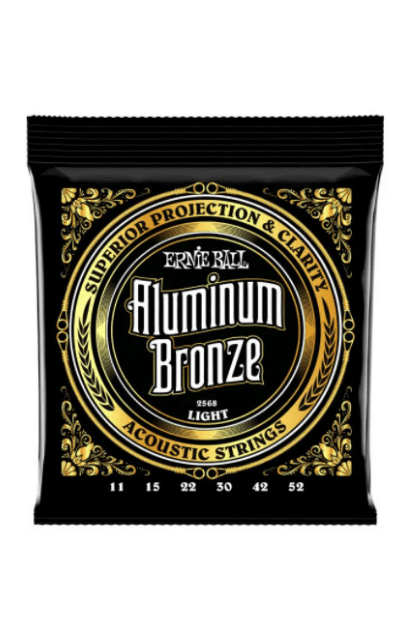
Ernie Ball Aluminum Bronze Acoustic Strings
Long lifespan and great tone across the lows, mids, and highs.
These strings offer exceptional balance, great feel, and a beautiful bright tone that perfectly complements any acoustic guitar. They require minimal stretch, and settle at pitch quickly.
Ernie Ball is one of the go-to names in the guitar strings and accessories business, so it should come as no surprise that they innovate in those fields. One of their most successful innovations has been their aluminum bronze acoustic guitar strings.
They used aluminum in the alloy instead of phosphor or any of the other more common metals, and as promised, it results in a unique tone that blends sparkling highs with surprisingly strong bass response – Ernie Ball designed this alloy blend for exactly this purpose.
In addition to the tonal differences, we did notice that these strings offered bell like clarity compared to bronze and phosphor bronze strings like the D’Addario EJ17, and the projection was incredible.
At the end of their 2 week shift on my guitar, they were still sounding fresh. They hadn’t lost any of their brightness, and they didn’t look much, if any different to when we first installed them. This goes some way to proving Ernie Ball’s claims of increased longevity due to the aluminum content, and the fact that they’ve managed this without coating is quite impressive.
If you’re a heavy strummer like me, you’ll appreciate the powerful bass response that comes courtesy of the hex core. The one downside we noted, however, was the lack of sustain. Notes rang clear, and separation was fantastic, but they certainly didn’t ring for long.
Stretch was minimal, which led to excellent tuning stability. There were a couple of tuning touch ups on the first day, but the strings settled quickly and held pitch for the remainder of the test.
Verdict: We really enjoyed playing these strings. The Ernie Ball Aluminum Bronze strings sounded good on soft arpeggiated playing, as well as loud, hard strumming. Across the two weeks test they held up really well, losing no brightness, and they suffered no breakages.
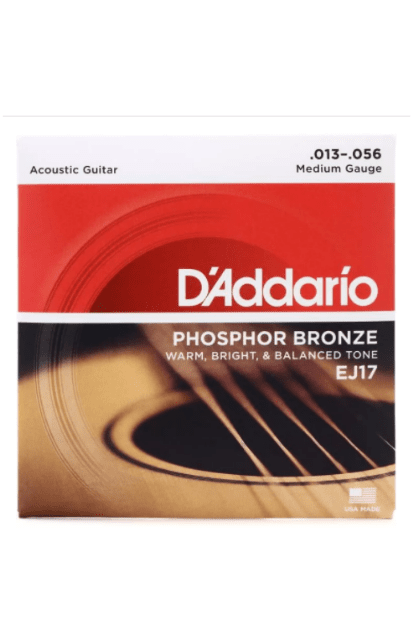
D'Addario EJ17 Phosphor Bronze Acoustic Strings
Budget acoustic strings with premium performance.
With these simple phosphor bronze strings, you'll get classic acoustic tones, with great shimmer and fantastic mid-range response.
As one of the world’s longest standing manufacturers of instrument strings, D’Addario is a brand that has come to stand for quality and reliability. This is absolutely apparent in their basic EJ17 phosphor bronze strings.
These strings were unpretentious, and because they are made with tried and tested materials and construction methods, they are well made, and consistent between packets.
I found that these strings were perhaps a little uninspired across the highs and lows, but the mids were clear and bright. If you’re a fingerstyle player, these strings should work out well, but heavy strummers may want to consider something like an aluminum bronze or an 80/20 bronze.
As far as longevity goes, they survived the two week test without breakages, although they were audibly duller by the end of the test – we suspect another 4 weeks with around 2 hours a day of play would render these strings dead.
The finish was noticeably rougher than other strings on test, which may explain the quick dulling, as the deep grooves are magnets for the dirt and grime that kill brightness in acoustic guitar strings.
Tuning stability was fairly average. They took a few days to settle, and stayed at pitch for around 4 to 6 hours on average before tuning was needed.
Verdict: These D’Addario phosphor bronze strings are bright and resonant, and certainly offer great value when you compare the sound with the low price. They will work well for most styles of music thanks to their presence in the middle frequencies.
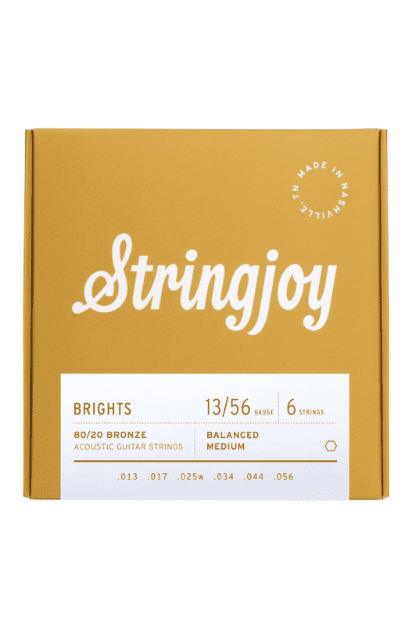
Stringjoy Brights 80/20 Bronze Acoustic Strings
High-performance guitar strings with nuanced tones and great lifespan.
If big volume, punchy mids, and perfectly clear highs are what you're looking for, these 80/20 bronze strings from Stringjoy will fit the bill. They're made by hand in the USA, and the attention to detail shows.
As we alluded to in the top 3 roundup above, Stringjoy is a relatively new brand, having only been established in 2014. In just a few short years, they have begun to take market share away from the big names, and with strings like these 80/20 bronze Brights, it’s easy to see why.
80/20 is a common alloy in use with acoustic strings, but make no mistake about it, you aren’t getting common tones here. We found them to have above average punch in the mids and some of the most crystalline highs you’ll find in any string.
Volume was superb with this medium gauge set, they projected very well. They were unusually dynamic, and were able to remain just as nuanced with gentle fingerpicking as they were with hard strumming.
When we wanted warmth and soft tones, the strings delivered, and when we sharpened up the attack looking for clearly defined string separation, we got that, too.
The ends of the wound strings are actually unwound, which really helps in threading through the tuning posts. Once we had the strings on and the ends trimmed, we found that they settled quickly during tuning, and needed less than half an hour of play time to stretch and hold pitch well.
After 2 weeks we were particularly impressed not just at the tone, but also that they still had their characteristic shiny finish. We found no noticeable dulling during the test, which is remarkable given the usual tendency of 80/20 to lose the shimmer fairly quickly.
Verdict: The Stringjoy Brights are an absolute pleasure to play with. They felt good under the fingers, they project beautifully and have an excellent tonal range. They are made by musicians, for musicians, and you can really tell that care has gone into the manufacturing process. They had an excellent lifespan, and really surpassed expectations.
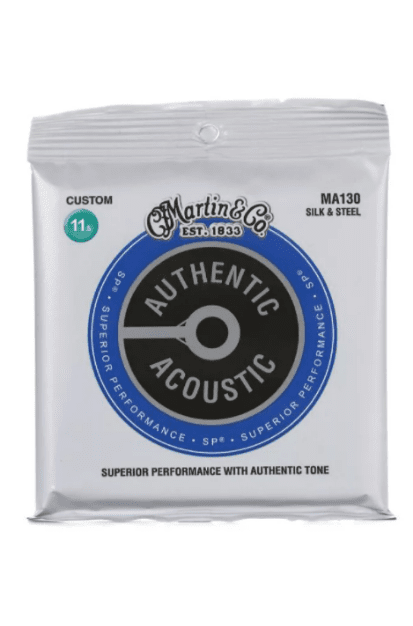
Martin SP Silk and Steel Acoustic Strings
Luxurious soft touch strings for discerning folk guitarists.
Folk and fingerstyle players will love these silk and steel strings. They offer unparalleled warmth and superb nuance after being properly broken in. They're some of the most durable silk and steel strings on the market and an excellent choice for acoustic players with a soft touch.
Although these strings aren’t great all-rounders, if you’re a fingerstyle or folk player and you’re looking for the warmest, mellowest tones possible, you’re most probably going to love these Martin Silk and Steel strings.
As you’d expect from Martin, these strings were of the highest quality. Playability and comfort were spectacular, which was largely due to the low string tension.
Volume was a bit of an issue, especially as strumming is out of the question with silk and steel strings. If you’re planning to play to any kind of crowd, you’ll almost certainly have to mic up as the nylon wrap can make it difficult for pickups to detect the strings, and this will lead to unreliable performance through amplification.
The SP in the model name stands for Superior Performance. These are Martin’s heavy duty silk and steel strings. They advertise that these strings are “designed to thrive during rigorous practice”. Heavy duty should be considered a relative term in this case – yes, they’re strong compared to standard silk and steel strings, but we did manage to break the B string by day 12.
Surprisingly, we actually found that the strings sounded better by the end of the test. They were a little bright for folk at the beginning, but they mellowed out over the following days and sounded great. The depth of tone was fantastic, which led to a rich and full sound, despite the lack of volume.
Tuning stability was good once the strings had settled. It did take a number of days for them to stretch, but once they had, they were rock solid. Do be careful while tuning these strings as they’re easy to break with overtightening.
Verdict: If you’re exclusively a folk or fingerstyle player, the Martin SP Silk and Steel set are probably the best strings for you. They do sound wonderful, but their lack of versatility across all genres does make it difficult to suggest a purchase unless you own multiple guitars, or only play these styles of music.
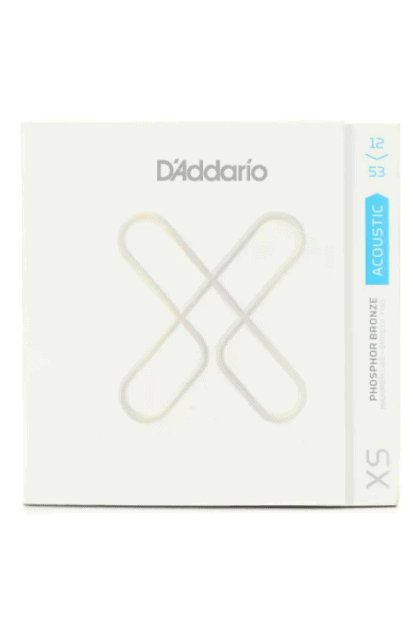
D'Addario XS Phosphor Bronze Acoustic Strings
High-end coated strings for players seeking long string life.
Coated strings can be something of an acquired taste, but the "barely there" layer on these phosphor bronze D'Addarios will have you questioning everything you know about coated strings. They play fast, and don't lose any of the brightness that you'd usually find in a phosphor bronze string.
D’Addario’s XS line is very much at the upper end of their range of guitar strings. These are coated phosphor bronze strings that work for pretty much every style of music and every level of player.
Unlike many other coated string sets, in which only the wound strings are treated, D’Addario coat all 6 strings on the XS line. The result is an unusually smooth finish, which honestly took quite a bit of getting used to. Once I’d played for a few hours, they started to feel pretty good. The comfort was striking, which really did make it easy to get carried away and play a lot longer than originally planned!
These strings are designed with a revolutionary “fusion twist” technology at the point where the ball end is secured to the string, which D’Addario claims increases tensile strength. We didn’t experience any string breaks on this set during the 2 week test, but that doesn’t necessarily mean that the design influenced the strength any more so than any other design.
One area that was extremely noticeable was the tuning stability. These strings by some margin had the strongest stability, and needed virtually no time to settle. In fact, once installed, they held their tune for the remainder of the test.
Their sound profile was fairly typical of any phosphor bronze string. They were warm, and overall ear pleasing, but the little brightness they did have was clearly suppressed by the coating.
At the end of the two week period, they sounded more or less identical to the day they were installed. I’ve heard of some players stretching out their use of D’Addario XS strings to as long as 6 months without any real loss of tone, so if extreme longevity is important to you, you’ll be super happy with these.
Verdict: The D’Addario XS Phosphor Bronze strings are ideal for players looking for incredible longevity and rock solid tuning stability. Being coated, they’re comfortable and last forever, but of course, this means that they won’t be as bright as uncoated strings. If this isn’t a negative for you, then these D’Addario XS strings might be a good option.
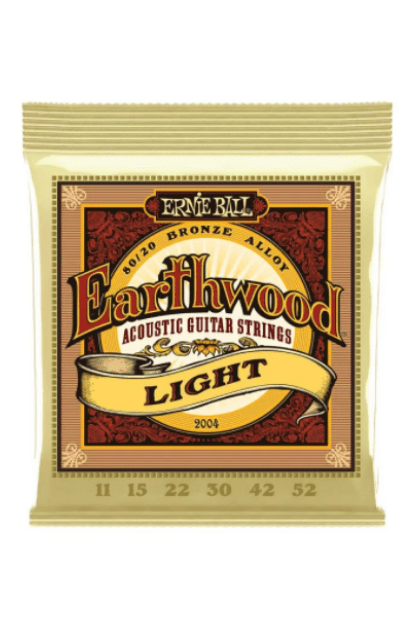
Ernie Ball Earthwood 80/20 Bronze Acoustic Strings
Simple bronze strings at a great price.
There's nothing fancy about these 80/20 Bronze strings, but they don't need frills, as they're pure tone. Great bass response, focused mids, and shimmery highs are just some of the benefits of playing with these strings.
Ernie Ball’s Earthwoods are some of the most popular acoustic string sets on the market, and for good reason. They’re inexpensive, sound good, and when they’re fresh out of the packet, their shiny bronze finish looks absolutely amazing.
When taking them out of the packaging, the first thing we noticed was the “Element Shield” packaging. Ernie Ball individually wraps and seals each string, which is really necessary with 80/20 bronze. Some bronze strings are known to come out of the packaging already partly pitted, so we can confirm that this packaging helps, as each and every string was in perfect condition.
Despite the low price, the quality was good. These strings are made in the USA using the best quality metals and manufacturing processes. The attention to detail in manufacturing definitely paid off – there were no breakages, and playability was good.
Clarity, sustain, and note separation was stunning. We would describe them as being jangly, yet well balanced. There’s no harshness or brittle sound, and fingerpicking results in a surprising warmth.
Tuning stability was certainly acceptable. They took around 3 days to properly settle, and only required adjustment every 3-4 days after that.
It should come as no surprise, however, that with at least 2 hours of use each day for 2 weeks, these strings became pretty flat. The lustrous shimmer from installation day had gone, leaving the strings looking dark, and almost brown. The beautiful brightness was all but gone, too, leaving nothing but dark, muddy tones.
Fortunately, the low price makes regular replacement a realistic proposition, but changing strings every 3-4 weeks will almost certainly become a hassle. If you absolutely can’t bear the thought of such regular replacement, Elixir 80/20 might be a better prospect for you.
Verdict: Ernie Ball Earthwood acoustic strings are almost perfect fresh out of the packet. They look good and sound even better, but the inevitability of corrosion dulling the strings quickly always remains. If you’re happy to change strings regularly, and you love a bright, vibrant tone, you might just love these strings.
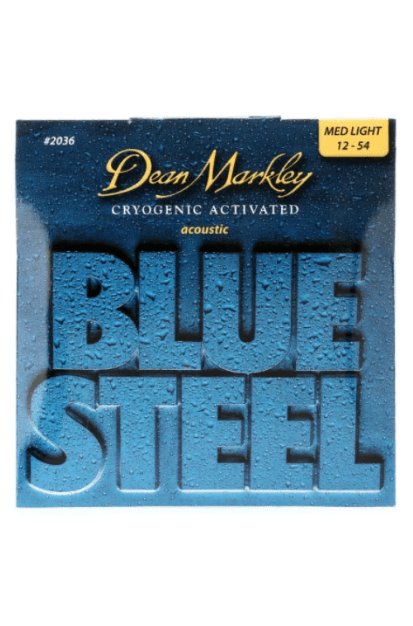
Dean Markley Blue Steel Acoustic Strings
Boutique guitar strings for the most discerning players.
These high tech strings are made from a copper/zinc alloy and are cryogenically treated for exceptional tone and consistency. They offer powerful bass response and remain punchy in the mids.
Dean Markley isn’t the biggest name in guitar strings, but they are known for their pioneering manufacturing techniques. In the case of these Blue Steel strings, cryogenic activation is used.
The strings are subjected to a quick immersion in liquid nitrogen, which reduces gaps between the molecules in the alloy with the aim of removing “transient frequencies”. We found that the sound was nicely balanced – lows were powerful, while avoiding muddiness, and the highs are bright and punchy.
They are made of an unusual copper and zinc alloy, which we found really accentuated the upper mids and the highs more so than anything else. Volume is also found in abundance with these Blue Steel strings.
I did note that they lack sustain. The punchiness of each strum is short lived, so if you’re looking for strings that ring on forever, consider an uncoated 80/20 bronze option.
Surprisingly for a premium string, they did not arrive individually packaged, instead, all 6 were in one package within the outer packaging. This made the process of installing them a little more difficult, and we would definitely have liked to have seen each string packaged separately.
The tone remained somewhat consistent for the entire 2 week test, although sustain did appear to become progressively worse. We did find tuning stability to be one of the stronger points of these strings. After a day they had stretched and settled, and only fell out of tune once around a week later.
Verdict: If you like to stand out from the crowd and use gear that few others are, then consider these Dean Markley Blue Steel strings. Whether you believe the claims of improved tone due to their -320 degree liquid nitrogen treatment or not, they did sound good, and longevity was not an issue unless you really need a good amount of sustain.
Final Thoughts
The best thing about guitar strings is that they’re relatively cheap, have a big effect on sound, and are almost universally compatible. If you’re not happy with what you’re running, you can change them for a completely different set for as little as $5, and have them installed and ready to play within half an hour. You’ll be amazed at how much impact something as simple as a change from 80/20 to phosphor bronze can have.

- Great Value Strings
- Aluminum Bronze
- Powerful Bass
- Bell Clarity
- Ernie Ball consistency
- Available as 10s, 11s, 12s, 13s

- Excellent Budget String
- Phosphor Bronze
- Clear Mids
- Average tuning stability
- Available as 10s, 11s, 12s, 13s


